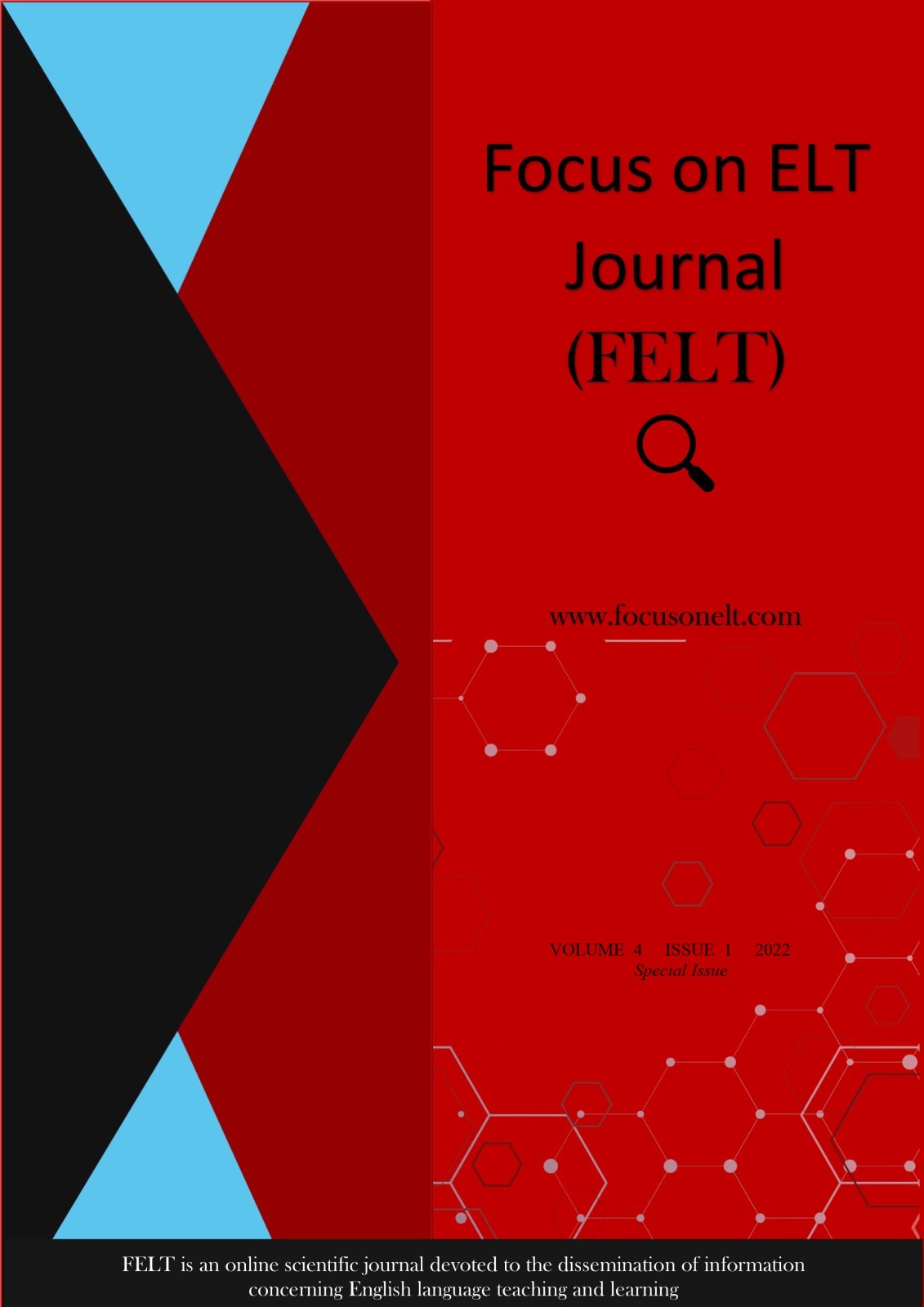An EFL Instructor’s Study and Teach Abroad Experiences and Complementary Views from Learners
Main Article Content
Abstract
The present qualitative case study aimed to explore the influences of an EFL instructor’s study and teach abroad experiences on her classroom implementations. It additionally investigated her students’ responses to the reflections of her study and teach abroad in the classroom. The findings revealed that these experiences contributed to the instructor’s both personal development and professional learning and further had impacts on her teaching practices. An in-depth analysis of multiple data tools; a semi-structured, individual interview with the instructor, her journal entries, and an open-ended questionnaire from 43 language learners, informed that study and teach abroad experiences contributed to the instructor’s world knowledge and intellectual growth through her teaching and other academic endeavors at an abroad university. It was also found that the learners appreciated the instructor’s explicitly referring to her international contacts as a means of providing authentic input, enriching the lesson content, fostering engagement in the class, and raising learners’ intercultural awareness. This study suggests developing teacher interculturality via study and teach abroad programs should be encouraged to better address intercultural topics in the language class. The process of preparing intercultural language teachers could be aided by teacher study and/or teach abroad programs.
Metrics
Article Details

This work is licensed under a Creative Commons Attribution-NonCommercial-NoDerivatives 4.0 International License.
References
Biraimah, K. L., & Jotia, A. L. (2013). The longitudinal effects of study abroad programs on teachers’ content knowledge and perspectives: Fulbright-Hays group projects abroad in Botswana and Southeast Asia. Journal of Studies in International Education, 17(4), 433-454. https://doi.org/10.1177/1028315312464378
Brinkmann, S. (2013). Qualitative interviewing. Oxford University Press. https://doi.org/10.1093/acprof:osobl/9780199861392.001.0001
Byram, M. (1991). Teaching culture and language: towards an integrated model. In D. Buttjes, & M. Byram (Eds.), Mediating languages and cultures: Towards an intercultural theory of foreign language education (pp. 17-30). Multilingual Matters.
Byram, M. (1997). Teaching and assessing intercultural communicative competence. Multilingual Matters.
Canale, M. (1983). From communicative competence to communicative language pedagogy. In J. Richards & R. Schmidt (Eds.), Language and communication (pp. 2–27). Longman.
Canale, M., & Swain, M. (1980). Theoretical bases of communicative approaches to second language teaching and testing. Applied Linguistics, 1(1), 1-48. https://doi.org/10.1093/applin/1.1.1
Creswell, J. W. (2013). Qualitative inquiry and research design: Choosing among five approaches. Sage.
Deardorff, D. K. (2010). Theory reflections: Intercultural competence framework/model.
https://doi.org/10.4135/9781071872987.n28
Denzin, N. K., & Lincoln, Y. S. (2008). Introduction: The discipline and practice of qualitative research. In N.K. Denzin & Y.S. Lincoln (Eds.), Strategies of qualitative inquiry (pp. 1- 43). Sage.
Gleeson, M., & Tait, C. (2012). Teachers as sojourners: Transitory communities in short study-abroad programmes. Teaching and Teacher Education, 28(8), 1144-1151. https://doi.org/10.1016/j.tate.2012.07.005
Gómez, R., & Fernando, L. (2012). Fostering intercultural communicative competence through reading authentic literary texts in an advanced Colombian EFL classroom: A constructivist perspective. Profile Issues in Teachers Professional Development, 14(1), 49-66.
Göbel, K., & Helmke, A. (2010). Intercultural learning in English as foreign language instruction: The importance of teachers’ intercultural experience and the usefulness of precise instructional directives. Teaching and Teacher Education, 26(8), 1571-1582. https://doi.org/10.1016/j.tate.2010.05.008
Hamza, A. (2010). International experience: An opportunity for professional development in higher education. Journal of Studies in International Education, 14(1), 50-69. https://doi.org/10.1177/1028315308329793
Harbon, L. (2007). Short-term international experiences and teacher language awareness. International Education Journal, 8(1), 229-243.
Harvey, S., Conway, C., Richards, H., & Roskvist, A. (2010). Evaluation of teacher professional development languages (TPDL) for teachers of languages in years 7-10 and the impact on language learning opportunities and outcomes for students. Ministry of Education. https://www.educationcounts.govt.nz/publications/schooling/evaluation-of-teacher-professional-development-languages-for-teachers-of-languages-in-years-7-10
Jarlais, D., & Stein, W. (2005). Southern wisdom: Tribal college faculty revaluation traditional ways of knowing. Tribal College Journal, 16(4), 10-14.
Kramsch, C. (2009). Cultural perspectives on language learning and teaching.In K. Knapp, B. Seidlhofer & H. Widdowson (Eds), Handbook of foreign language communication and learning (pp. 219-245). Mouton de Gruyter. https://doi.org/10.1515/9783110214246.2.219
Kramsch, C. (2010). Culture in language teaching. In M. Berns (Ed.), Concise Encyclopedia of Applied Linguistics (pp. 276-282). Elsevier.
Kruger, D. P., Gandy, S. K., Bechard, A., Brown, R. & Williams, D. (2009). Writing a successful Fulbright group projects abroad grant: Voices from a journey to South Africa. Journal of Geography, 108, 155-162. https://doi.org/10.1080/00221340903428772
Liddicoat, A. J. (2011). Language teaching and learning from an intercultural perspective. In E. Hinkel, (Ed.), Handbook of research in second language teaching and learning, (pp. 837-855). Routledge.
Littlewood, W. (2011). Communicative language teaching: An expanding concept for a changing world. In E. Hinkel, (Ed.), Handbook of research in second language teaching and learning, (pp. 541-557). Routledge.
Maxwell, J. A. (2013). Qualitative research design: An interactive approach. Sage.
Millar, K. J. (2006). Teacher learning from professional development “abroad”. Paper presented at the International Studies Association 2006 Annual Meeting, (Accession number: 27207075).
Moorhouse, B. L., & Harfitt, G. J. (2021). Pre-service and in-service teachers’ professional learning through the pedagogical exchange of ideas during a teaching abroad experience. Asia-Pacific Journal of Teacher Education, 49(2), 230-244. https://doi.org/10.1080/1359866X.2019.1694634
Patton, M. Q. (2015). Qualitative evaluation and research methods. Sage.
Pinzón, A. N. B. (2020). Authentic materials and tasks as mediators to develop EFL students’ intercultural competence. HOW Journal, 27(1), 29-46. https://doi.org/10.19183/how.27.1.515
Sahling, J., & De Carvalho, R. (2021). Understanding teacher identity as an international teacher: An autoethnographic approach to (developing) reflective practice. Journal of Research in International Education, 20(1), 33-49. https://doi.org/10.1177/14752409211005380
Saldaña, J. (2013). The coding manual for qualitative researchers. Sage.
Smolcic, E., & Katunich, J. (2017). Teachers crossing borders: A review of the research into cultural immersion field experience for teachers. Teaching and Teacher Education, 62, 47-59. https://doi.org/10.1016/j.tate.2016.11.002
Stake, R. (1995). The art of case study research. Sage.
Vogt, K. (2016). Teaching practice abroad for developing intercultural competence in foreign language teachers. Canadian Journal of Applied Linguistics, 19(2), 85-106.
Yin, R. K. (2009). Case study research: Design and method. Sage.
Yin, R. K. (2018). Case study research and applications: Design and methods. Sage.

